What are the three main reasons you are running for this office? Do you see any potential conflicts of interest?
As an uncompromising constitutional conservative, I am the best candidate to serve in the Texas Court of Criminal Appeals, Place 8 because:
- As a district judge currently serving my second term, I have a proven track record of efficiency, effectiveness, transparency, and saving taxpayer dollars.
I am efficient and effective. Upon taking over the 405th District Court, I transformed the court from the least effective, least efficient district court with the highest backlog of any district court in Galveston County, into the most efficient, most effective district court with the lowest backlog.
I provide transparency and actively fight for it. I believe in transparency at all governmental levels. Courts are the least transparent of our three branches of government. I promised voters that I would improve the transparency of the court, and I have kept my promise. Upon being elected as the judge in the 405th District Court, I launched a court Facebook page where I inform the public about the court, its proceedings, and provide education about the law and our justice system. Through the Facebook page and in person to jury panels, I inform the public that these are their courts, paid for with their tax dollars, and they are entitled to sit in the court and watch any proceeding (with very few exceptions). I encourage them to let others know who may be interested.
I am an advocate for the tax-payer. By improving efficiency, auditing vouchers of court-appointed attorneys to ensure accuracy and prevent over-billing, and implementing various cost-savings measures, I have saved taxpayers thousands of dollars every year I have served. I created an annual “Rocket Docket” which ensures prosecutors address the lower-level felony cases that frequently get ignored in favor of the higher-level and high-profiles cases. For the Rocket Docket, we call in all of the pending, victimless state-jail and third-degree felony cases (while all of society is a victim in many of these cases like drug possession cases, when I say victimless, I mean without a specific, named victim). We assemble all of the defendants - those in jail and on bond, the prosecutors, staff from the DA's office, the probation department, criminal defense attorneys, and what we call a jail-docket criminal defense attorney who is appointed just for that day to advise defendants who do not yet have an attorney but would like to negotiate with the district attorney’s office. Then the prosecutors and defense attorneys negotiate and work out cases. Several are dismissed and dozens enter plea agreements. No one forces or coerces anything. If a defendant does not want to accept the plea agreement, he/she will get a fair trial as will any defendant. We resolve 60-90 cases in a single day every Rocket Docket. This gets people out of the Galveston County Jail more quickly, provides people with the help they may need through probation to reduce recidivism, and eliminates the need for further accumulation of court-appointed attorney fees and court resources.
- My experience demonstrates quality over quantity.
While my opponents have more years of criminal legal experience, my experience demonstrates quality over quantity. After law school, I worked for several years for large international law firms representing businesses of all sizes, including Fortune 500 companies, in complex commercial litigation, labor and employment law, bankruptcy law, and other areas of civil law. In 2010, wanting to be more involved in my own community in Galveston County, I started my own successful law firm close to home where I represented businesses and individuals. I litigated cases in Texas and in other states. I tried cases in front of judges and juries in state and federal courts. I took cases up on appeal in state and federal courts.
Many of the cases I litigated involved highly-complex issues, multiple parties, and multiple claims and defenses. Civil law is much more broad, complex, and involved than criminal law. Criminal law is straight-forward and has very few gray areas. It is generally limited to the U.S. and Texas Constitutions, the Penal Code, the Code of Criminal Procedure, and a few tie-in statutes. The Rules of Evidence for civil and criminal cases are virtually the same.
My experience has served me well as a district judge. In the 405th District Court, I preside over felony criminal and civil cases. While my docket is fairly evenly split, approximately 75% of my time is spent on felony criminal cases (civil cases generally resolve themselves). I have presided over thousands of felony criminal cases ranging from state jail felonies (e.g. possession of less than a gram of a controlled substance) to capital murders.
My background serves as a huge asset to the Court of Criminal Appeals. The complexity of the legal issues I have successfully addressed over the years demonstrates that I have a broad understanding of the law. It also demonstrates that I am excellent at legal research, writing, analysis, and identifying important issues. I am able to cut through the excess and irrelevant arguments to identify the key points.
Further, unlike my opponents, I do not have the mindset of a life-long prosecutor where all defendants are presumed guilty and the longest possible prison sentence is sought. I look at each case individually, presume the defendant innocent, safeguard the defendants’ constitutional rights, and ensure due process and a fair trial. When a defendant is found guilty, I do not assume the longest possible prison sentence is appropriate. I take into account all of the relevant facts and render a decision that I believe serves the interest of justice. In the past, that has included deferred adjudication for a non-violent drug addict who wanted and needed help with rehabilitation to a 99-year prison sentence for a child predator.
- I have the best academic credentials of any candidate in this race.
No other candidate matches my academic credentials. I graduated from the University of Houston Law Center in the top 15% of my class. While in law school, I: (a) interned for two federal court judges (Judge Sim Lake and Judge David Hittner) and First Court of Appeals Justice Tim Taft; (b) earned my mediation certification and mediated cases in the justice of the peace courts and for the Better Business Bureau; (c) competed in numerous moot court competitions across the United States; (d) organized and managed intramural legal advocacy competitions at the Law Center; (e) served as the President of the Hispanic Law Students Association; and (f) worked part-time for a law firm during my third year of law school.
Do you think judges should be elected by the people, or appointed by a commission?
I believe judges should be elected by the people, so that the people can hold them accountable. Accountability is why courtroom transparency and communication is so important and why I promote it.
What differentiates you from your opponents?
My response to Question 1 certainly demonstrates what differentiates me from my opponents. In addition to what is set forth there, I believe my experience in private practice and as a small business owner (my own law firm as well as two other small businesses) makes a big difference. I understand the importance of efficiency and doing more with less. I am very conscientious about the use of taxpayer dollars. I look for ways to improve efficiency, reduce costs, and save money. By implementing creative methods that do not sacrifice justice, I have saved thousands of taxpayer dollars each year I have been on the bench. In contrast, one of my opponents has been a life-long government employee who is used to government bureaucracy and relying on taxpayer dollars. My other opponent is similarly situated, having spent most of his career as a government employee.
Please describe the changes you will make to improve the efficiency of your court, yet remain thoughful about rulings/orders - that allows all parties to be heard and their arguments considered. Please specifically address how many days a year your court will be “in session.”
Unfortunately, I cannot answer this question regarding efficiency because the Court of Criminal Appeals lacks transparency. I will need to be elected and in the position in order to fully address the transparency and the efficiency issues. My record as a district judge, however, demonstrates that I will look for and implement ways to make the Court as efficient as possible without sacrificing justice.
As for the number of days per year that the Court will be in session, the Presiding Judge has the authority and control over that issue. I will, however, do everything I can to ensure that the Court as a whole is working full time to address as many cases as possible and to be as efficient as possible.
I have proven in my role as a district judge that no one will work harder than I will to do the work the people have entrusted in me. In fact, I have always gone above and beyond what is necessary. As a district judge, I have volunteered for almost every “no-refusal” weekend where I stayed at the police department overnight on a weekend or holiday to sign blood search warrants in suspected drunk driving cases. When the no-refusal program changed to a remote blood warrant program, I volunteered to be on call around the clock for a week at a time on a rotating basis. I also make myself available around the clock to law enforcement for all types of search and arrest warrants.
Are the United States and Texas constitutions living documents? Please answer in the context of Progressivism versus Originalism.
Absolutely not. The very nature of a constitution is that it is static and unchanging. As originally written and intended, the United States Constitution is binding on us today. The Founding Fathers made clear that the purpose of the Constitution, the Supreme Law of the Land, is to “secure the Blessings of Liberty to ourselves and our posterity.” Like Justice Clarence Thomas, I am an originalist. I believe that all words of the constitution must be construed, interpreted, and applied with the original meaning ascribed therein by the Framers.
Please describe what you believe are the most significant issues in this race, why and what you'll do to address them?
Recent Court of Criminal Appeals decisions have demonstrated that some on the Court have ventured into judicial activism. If elected, I would work to prevent such activism. In each case, I would not base my decisions solely on case law or stare decisis as others clearly do. I would first look to the U.S. and Texas Constitutions, then to the applicable duly-enacted constitutional statutes. I would strictly construe and apply the applicable language to the case at hand to determine the appropriate decision. Then, I would work to convince my colleagues to do the same. If my position is in the minority and I am unable to persuade my colleagues to join me, I will write a respectful dissenting opinion to inform the public of my position, the reasoning behind it, and the law upon which it is based.
Another significant issue, and one that greatly disturbs me, is the fact that our criminal justice system is frequently and increasingly being used for political gamesmanship. More and more we see our criminal justice system being used to harass, persecute, and punish people solely because of their social or political views. I would like to work with our legislators on criminal justice reform measures to address this and other areas of criminal law that need to be reformed.
What Texas State court decision do you think has most impacted society? How and Why?
Every court decision (especially decisions from appellate courts that have precedential value) has an impact. The impact usually has a ripple effect in society. Some decisions have bigger ripple effects than others. Thus, this is a very difficult question to answer.
One recent Texas Supreme Court decision that comes to mind that has impacted society and will continue to impact society in a very significant and positive way is Patel v. Texas Department of Licensing and Regulation. In this case, the Court found the provisions of the Texas Occupations Code and Commission rules that require eyebrow threaders complete at least 750 hours of mostly irrelevant training to obtain a state license was so oppressive as to violate the Article I, § 19 of the Texas Constitution.
Patel is a huge win for small businesses and individuals who are overburdened and oppressed by overreaching and overbearing government regulations that prevent or inhibit them from earning a living. Patel provides a pathway to challenge such regulations. It also provides guidance to the State Legislature and regulatory bodies to ensure that future laws and regulations comply with the “due course of law provision” as established in the Texas Constitution. I believe that this case will have a far-reaching ripple effect that benefits individuals, small businesses, and the Texas economy for decades to come.
As a judge, what do you believe the goals of the criminal justice system should be?
(1) Punishment; (2) Rehabilitation; (3) Deterrence.
Apparently in conflict with current pratice in the courts Art. 19.27. of the Texas Code of Criminal Procedure states "ANY PERSON MAY CHALLENGE. Before the grand jury has been impaneled, any person may challenge the array of jurors or any person presented as a grand juror. In no other way shall objections to the qualifications and legality of the grand jury be heard. Any person confined in jail in the county shall upon his request be brought into court to make such challenge." What is the practical application of this statute?
This statute allows a defendant or anyone else to challenge the qualifications or prospective bias of any or all prospective grand jurors before a grand jury is impaneled. This can be used to ensure that the accusatory body that will hear cases for a decision on whether or not to indict, is qualified and impartial. It is clear that there are some who, for political or other purposes, seek to prosecute others strictly for harassment, embarrassment, revenge, or simply because they have political or social opinions that differ from the person pursuing prosecution. Practically speaking, this statute may be used to help prevent abuse of the grand jury system in such cases.
Who or which class of Texan does the Code of Criminal procedure 20.09. have in mind when it mentions "any Credible Person". How does the particular class invoke initiation of a Grand Jury investigation? CCP Art. 20.09. DUTIES OF GRAND JURY. The grand jury shall inquire into all offenses liable to indictment of which any member may have knowledge, or of which they shall be informed by the attorney representing the State, or any other credible person.
The “credible person” in this context would be a witness (whether a Texan or not) brought before the grand jury who can testify as to alleged criminal activity. The grand jury may ask questions of the witness. If they find the witness to be credible, then they may pursue additional information about the alleged criminal offense and then ultimately vote on whether or not to indict the defendant.






